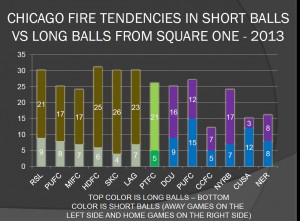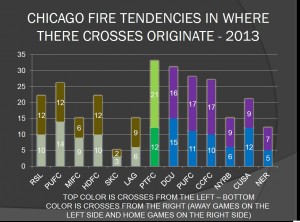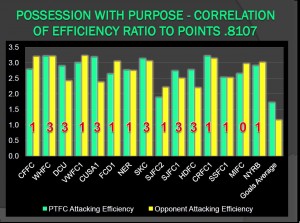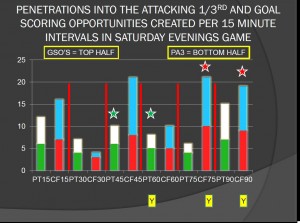Match Analysis – Portland Timbers (2) v Chicago Fire (2)
Ninety odd minutes of brilliant entertainment for both teams in this cracker as Portland take 1 point in Chicago. And for those counting the number is 12… or a Baker’s dozen if Cup games are included.
Yes, the result could have been better – three points in Chicago would have been superb but it didn’t happen – I think this quote from Caleb after the game says it all…
“We’re disappointed. It’s a bit of a bitter pill, but I think we will learn from it, we will be better from it. We didn’t lose the game. We still got a point…”
Snap… on to business and perhaps a flutter offered here and there that might have value as a ‘learning point’ given the outcome of this game?
As usual some intriguing offerings from our friend TheAxePDX on his take of the game… while Kip Kesgard adds his thoughts as well.
And to ensure a ‘fair and balanced viewpoint’ here’s what Guillermo Rivera offered up from Chicago-Now.
Before kicking off my analysis though here’s a very special shout-out to the what Daniel Honigman indicated was a “ridiculous turnout from the Timbers Army and Timbers Army Heartland Regiment”! My bad for missing that the first go-round!
Toyota Park – While it wasn’t filled to capacity (perhaps the NHL playoffs had something to do with that?) it was pretty full. All told 15,349 people (to include a contingent of Timbers Army supporters) turned their 30,698 eyes towards the pitch.
I wasn’t there to see if the pitch played slow and sticky but I do sense the extra length may have played a part in this game. One example of that might be the number of fouls committed by Portland late in this game.
They conceded 10 fouls in the first 59 minutes of play and 10 fouls in the last 31 minutes of play; nine of those last 10 fouls came in the defending half of the pitch.
For me that is an indicator that there were some tired legs on the pitch and the Timbers were finding themselves ‘out of position’.
Others may have a different point of view but of those nine fouls in the defending half 8 of them were in the defending third and one of them (the one that led to the equalizer) came in perhaps the worst place of all to concede a free kick; just center and atop the 18 yard box.
Weather – All told not really bad conditions – a bit of wind in the windy city was present but thankfully neither the humidity or temperature were too high to compound ‘getting tired’ conditions above and beyond the added length of the pitch.
I do wonder if it did impact Porter’s decision to pull Diego Valeri at the 67′ minute mark though. Caleb does offer substitutes but his tendency is to make those changes on or around the 75 minute mark not the 65 minute mark.
Perhaps bringing on Sal Zizzo, at that time, had more to do with saving Valeri’s legs than the humidity coupled with the extra field length?
Standings – No significant change in the standings as a result of this game; Chicago still hover quite low in the Eastern Conference while Portland remained third (still with two games in hand against Real Salt Lake).
For the Chicago types though, they should consider this result a very good one – again Magee influenced the outcome in a game and perhaps one positive take-away from this for Portland is that they don’t have to face that diminutive diver again like they would have if LA Galaxy hadn’t traded him to Chicago…
In my view Chicago made a ‘great’ move in giving up Rogers for Magee – Rogers has yet to influence any outcome on the pitch for LA and since that blow-out of Seattle, LA have really struck a loose chord…
Formation – As noted in my match preview we’d probably see Rolfe and Magee up top in a 4-4-2; we did and for the most part Chicago ran this approach until Santos made an appearance in the second half. And when Santos did come on Klopas rotated to a more aggressive – possession based – 4-2-3-1.
His team benefited from that and some strong evidence to support that rests with possession information. At half time it was noted that Portland had 63% of possession – by game end that had been whittled down to 51%.
Klopas should have gained some useful info based on that change and barring additional injuries, along with a return of Lindpere, I could see Chicago making a strong run to get back into the playoff hunt.
With respect to Portland – I was hopeful of seeing another new wrinkle this week and we did. As I offered up in my match preview we did get to see Zemanski rotate in with Chara and Johnson as opposed to seeing Kalif in place of Wallace.
Not sure if that had anything to do with Kalif having some leave time earlier this week but bottom line here was that group of six was very successful until the 60 minute mark or so.
In case you missed it there was a slight tweak to that 4-3-3 formation around the 10 minute mark. Up to that point Chicago had had early success in penetrating the wings and offering up opportunities towards the middle of the box. With Chara and Zemanski ‘bucketing up’ around the 12 minute point that penetration pretty much ended until the second half.
In essence the formation altered from a “CDM” approach to a “bucket approach”… with the other attacking players still rotating as opportunity presented itself.
Goals Scored – Route 1 to begin with and a counterattack after winning a ball in the midfield led to goal 2. If you’re going to work to a direct attacking style then it’s critical you can score goals in that approach.
Portland did and that is two games running now where an over-the-top ball has led to a direct attack that resulted in a goal.
Bottom line here is that Valeri was professional in his clinical finishing and the Timbers struck home. As for the counterattack – Chara won the ball in midfield and Piq made a great holding-run down the right – got loose working back up top and laid a superbly paced ball back to Zemanski for him to slot home goal 2.
As for Chicago – Kocic admitted he could have done better protecting the ball in the post game interview. Here’s his thoughts after the game…
“First of all, I think I should have been a little bit better getting the ball, but between two, three players I thought maybe one of them was going to touch me and my hands were ready for it. I tried to push it away but unfortunately it hit Magee in the leg. That’s Magee, you know, it always bounces his way. Unfortunately this time, he bounced the ball in and he scored a goal.”
I’m not sure I agree with all that but that doesn’t matter – in the heat of the game odd things happen… Instead I would just offer I agree that Kocic could have done better that game.
In my view Kocic just didn’t appear comfortable at all the whole game and communication between himself, Baptiste and Kah looked almost non-existent at times.
Porter said he learned some things in this game… perhaps improving communication with the back-four is one of them?
As for the second Chicago goal – a brilliant free-kick really; Paladini placed it superbly and even if Kocic hadn’t been looking to adjust his position right before Paladini struck it that ball was going to go in.
Curved Air – Not a whole lot of traffic out of the Chicago Keeper’s box Saturday evening and (perhaps?) this is an explanation…
Portland simply didn’t penetrate that much this game compared to other games. All told the Timbers penetrated the Chicago defending third just 32 times and created only 26 scoring opportunities.
That is 12 fewer penetrations than averaged this year and 11 fewer goal scoring opportunities averaged this year. So while possession was high this game and Portland did get two goals – the defensive side of ‘possession’ (keep the ball so the opponent can’t use it) never got going.
And perhaps one of the best possession players on the pitch was subbed at perhaps the most crucial time in the game… others may have a different view???
For those interested here’s a Diagram offering up square 1 distribution for Chicago to date with Portland info included:
As for Portland – Kocic was busy. He ended up distributing the ball from Square 1 39 times and to go with that Portland had 23 defensive clearances. Pretty much indicating, again, that Chicago played off their front foot for most of this game and Portland didn’t.
So how about Curved Air crosses – here’s a diagram offering up the volume of crosses submitted by Chicago this game…
From that viewpoint (green bars) this was the most productive game Chicago has had all year in delivering crosses. And again the data supports some heavy duty aggression by Chicago throughout this game.
From the Portland viewpoint crosses weren’t the main avenue for aggression; in this game they ended up with just 11 crosses that’s 11 fewer crosses (on average) in all their games to date… again another indicator that ‘possession’ this game wasn’t all that really mattered.
So put that into context here’s how this overall game compared to all others so far this year…
Clearly (far left bars) Chicago outperformed Portland when it came to combined Possession with Purpose. And even though Chicago controlled much of the play between the pipes this was still one of the more productive attacking games for Portland this year (8th overall).
But from a defensive standpoint this game, for Portland, ranked up there with being one of the worst so far this year. Only the defensive performance against Vancouver and Colorado have been worse; both ties and both come from behind ties.
So (perhaps?) a learning point here is that Portland need another defensive minded (box-to-box) midfielder to come in and help shut the door or they need another fullback to step up and spell the tired legs of Jewsbury?
Possession – Here’s how things took shape with regards to penetrations and goal scoring opportunities being created this game…
As noted earlier Porter might have tweaked his defensive alignment early on and perhaps an indicator to support that move is this diagram; note that the 2nd fifteen minutes for Chicago dropped off considerably without a corresponding increase by Portland.
For me that speaks more to a defensive adjustment than an attack by Portland; especially since the penetrations and GSO’s for Portland also decreased.
As for the overall diagram – clearly Chicago were the more aggressive team while Portland looked to counter. That strategy again paid off as the Timbers got their second at the 58 minute mark.
After that is when the substitutions began, Santos came on for Rolfe and Klopas went with his big guy up top – not a minute later Porter countered by bringing on Zizzo for Valeri.
I’m not sure if that substitution was tactical given the nature of the game or precautionary given the tender hamstring Valeri has; perhaps others know better?
One minute after Valeri went off Magee got their first goal — more subs followed for Chicago and at the 82nd minute Paladini (a sub) nets that wicked good free-kick.
So overall Chicago, exceeded their home averages in every attacking category (to date) and for them this was a great result.
If you were a betting person and took my advice on +2.5 goals, congratulations, you should have made some money…
As for Portland, they simply did not have one of their better games. However sliced though, they walked away with a point and, up until that foul just atop the 18 yard box, they might have walked away with three…
Defense – I’ve pretty much touched on this earlier but one thing I didn’t submit was this… Zemanski brought great strength to the middle and allowed Portland to show a different look in working towards goals but with that strength came a weakness.
When it came time to make substitutions (defensive ones) Zemanski wasn’t on the bench to go-to. Some might offer that bringing on Sal was a defensive substitution; I’m not convinced.
I would offer that Sal is not a typical (in your face) box-to-box defensive midfielder – in hindsight perhaps no substitution or bringing on Miller/McKenzie was more suitable?
Hard to say – maybe this was one of those things that Porter indicated they learned as a result of this game – maybe others have a different view?
Wild Things – Not much to offer from a Chicago Fire standpoint – no glaring fouls and given the game conditions Paladini wasn’t really in a position where he might garner another Yellow that could open up an opportunity for Portland.
As for Portland; well…… I’ve already touched on how many fouls they conceded and where those fouls occurred…
As noted in my match preview – giving away set-pieces in the defending third/half creates an immediate goal scoring opportunity; and it did… and the Timbers suffered the loss of two points in this match because of it.
Bottom line here is Portland simply failed in this part of the game and tired legs probably had more to do with that than anything else…
Substitutes – For Chicago, Santos was called upon first and while he didn’t score his presence helped alter their approach in attack.
With the addition of Paladini that too forced a more aggressive tone from Chicago. As for MacDonald – hard to imagine that guy is a DP – perhaps he has as much value to Chicago as Boyd had to Portland last year?
In considering all the research I offered up last year on top salaries, and DP’s who are strikers, it simply doesn’t make sense to spend the big bucks on strikers when it’s the midfielders who really influence the outcome of games in the MLS.
With respect to Portland – no more shining example on well invested money can be offered up when considering the influence that DP’s Valeri and Chara bring to the pitch – perhaps another influential DP midfielder finds his way to Portland during the summer transfer window?
In my view Portland need another fullback and another midfielder to get this team ready for the final playoff push.
As for Porter’s substitutions – the easy one first – Valencia came on at the 87 minute mark and that really didn’t offer up enough time for him to influence the outcome. There was a marked increase in pressure towards the end and into added time but the juice from the other players had run out.
As for Sal – I like this guy and he has tons of energy to offer but…… for me I’m just not seeing him fit into the developing scheme that Caleb is looking to work from.
He’s great bombing down the wing and seems to be picking up playing a more ground penetration type game but for this game the real role, in my opinion, should have been to stop the leak down our right – their left.
And while the penetrations down that wing were pretty much shut down the final 15 minutes the number of goal scoring opportunities coming from that side increased considerably.
For example – in the last 30 minutes of the game Chicago penetrated our right side just six times but in so doing they generated 10 goal scoring opportunities from that same side.
In other words when Chicago got in that side that stayed in that side… and when looking at the pattern of defensive clearances it just doesn’t appear there was much aggression occuring on that side at all.
Even more intriguing is the lack of clearances out wide left as well. It’s almost as if Portland were ceding the crosses to prohibit deep dribble-drive penetration into the side of the 18 yard box?
I’m not sure if that was intended but it might explain why Chicago generated more crosses this game then any other game played to date – perhaps others have a different view?
In closing – Bittersweet is a good way to describe this game – no rest for the wicked though as Wednesday comes oh so soon. No Match Preview for that one; I will be in That Town Up North (TTUN) taking in the USA match against Panama.
You can follow me on twitter @chrisgluckptfc
Next Up Match Analysis – Portland vs Tampa Bay and my Match Preview of Portland vs FC Dallas.




